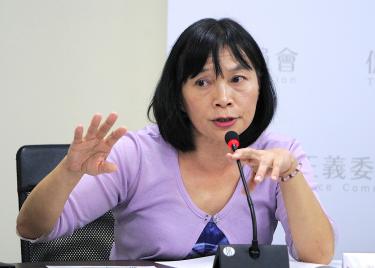A decision about the fate of the Chiang Kai-shek Memorial Hall in Taipei would be made before early next year, Transitional Justice Commission members said yesterday.
The commission would also consider options for transitioning the Cihu Mausoleum (慈湖陵寢), where Chiang Kai-shek (蔣介石) is entombed, they told a news conference in Taipei.
The news conference had been called to announce the dates and locations of three public meetings on implementing transitional justice and a human-rights vision for the nation.
While legislation can provide recompense for the financial damages and loss to reputation suffered by victims of the White Terror era, such measures in themselves are not enough to meet the demands of justice, commission Deputy Chairman Chang Tien-chin (張天欽) said.
The commission is dedicated to recovering historical truths, removing authoritarian symbols and healing societal trauma, so it is inviting victims of political persecution or their surviving family members to the public meetings so that it can explain its goals and policies, and to hear their opinions, Chang said.
The first public meeting is to be held tomorrow at the Jingmei Human Rights Memorial and Cultural Park in Taipei’s Xindian District (新店), the commission said.
The second is scheduled for Sept. 16 at the Taichung Cultural and Creative Industries Park and the third will be at the Kaohsiung Municipal Library on Sept. 30.
The Chiang Kai-shek Memorial Hall would “certainly undergo a transition,” which the Ministry of Culture has been preparing for since last year, commission member Yang Tsui (楊翠) said.
The commission would soon begin talks on the specifics, such as uses for the site and what should be down with Chiang’s statute, she said.
The ministry is drafting amendments to the Organization Act of National Chiang Kai-shek Memorial Management Office (國立中正紀念堂管理處組織法), which would lay out the steps regarding those issues, she said.
Asked about commission’s plans for the Cihu Mausoleum, Yang said the mausoleum is “definitely on the commission’s agenda,” but it has not begun discussions about it.
Lan Yun-jo (藍芸若), the daughter of White Terror victim Lan Ming-ku (藍明谷), said it is not right that the persecutors have not been identified or that she had to live with the infamy of being the daughter of an accused communist spy for 70 years.
“My father would have been pleased to visit the memorial parks if they had imprisoned him for a dozen years instead of being shot,” she said. “Many victims are living in the shadow of history and I hope the commission would give us justice.”
Lang Ming-ku, a 32-year-old teacher in Keelung, was arrested in 1951 and executed without trial.
Source: Taipei Times - 2018/09/07





















